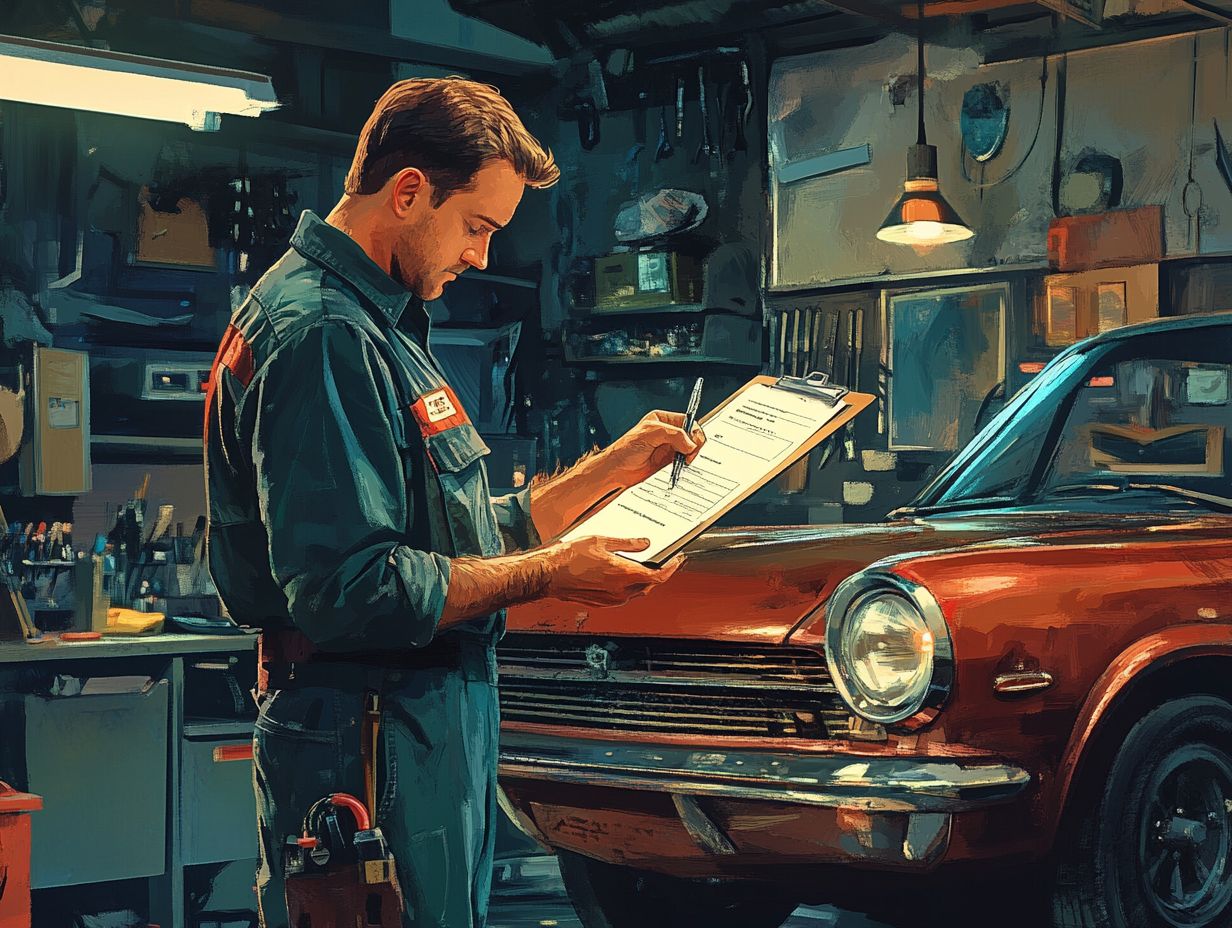Does Your Used Car Come with a Warranty?
When you’re in the market for a used car, understanding the nuances of warranty coverage is absolutely essential.
A used car warranty can provide you with invaluable peace of mind, shielding you from those unexpected repair expenses. This article delves into the various types of warranties available, highlighting the benefits they offer and what s typically included.
You will also find guidance on how to determine if your vehicle already has an existing warranty and what steps to take if it doesn t. By understanding these critical aspects, you can make a more informed decision and elevate your overall car-buying experience.
Contents
Key Takeaways:
- Don’t overlook the importance of a used car warranty it can save you money!
- Know what is included and excluded in your warranty to avoid surprises.
- Research your options before buying to ensure you get the best coverage.

Understanding Used Car Warranties
Want to make a smart choice? Understanding used car warranties is key! These warranties act as a safety net. They help with unexpected repairs and provide peace of mind during ownership.
Whether you re contemplating a manufacturer warranty, an extended warranty, or third-party options, understanding the specifics of warranty coverage can greatly impact your auto loan decisions.
This Buyer s Guide is designed to shed light on the different types of warranties available, their advantages, and how they integrate into the broader framework of consumer protection for motor vehicles.
What is a Used Car Warranty?
A used car warranty acts as a service contract that provides coverage for specific repairs and replacements on pre-owned vehicles. This coverage is important as it enhances your vehicle’s dependability and safeguards you against unexpected repair costs after purchase. To learn more about securing the right coverage, check out this guide on how to find the best warranty for used cars.
Understanding the intricacies of these warranties is vital if you want to steer clear of hidden expenses down the road. There are various types of coverage available, including:
- Powertrain warranties, which focus on critical components like the engine and transmission.
- Bumper-to-bumper warranties, which cover nearly all parts except for wear-and-tear items.
Each option serves a unique purpose, so it s important to assess your specific needs and the vehicle’s repair history. Choosing the right type of warranty can significantly affect the model’s reliability and past maintenance, ultimately influencing your long-term ownership satisfaction.
Types of Used Car Warranties
You ll encounter several types of used car warranties, including manufacturer warranties, extended warranties, and third-party warranties. Each is designed with distinct coverage options to cater to various needs. Understanding these warranty types is crucial for you as a car buyer to ensure you choose a plan that best fits your vehicle’s protection requirements.
Each warranty type comes with its own set of benefits and potential drawbacks. Manufacturer warranties typically offer robust powertrain coverage, protecting those essential components. However, be aware they might expire sooner than you d like, often dictated by mileage limits.
Extended warranties can grant you peace of mind, but they frequently come with more exclusions and higher costs. In contrast, third-party warranties might provide a wider array of options, yet their reliability and quality of customer service can vary significantly. It s essential to evaluate these factors carefully to identify which warranty aligns with your long-term ownership goals.
Benefits of Buying a Used Car with a Warranty
Acquiring a used car with a warranty brings a host of advantages, particularly peace of mind and cost savings essential elements for the discerning car buyer in today’s market.
A warranty is your shield! It protects you from those unexpected vehicle repairs and associated costs. This safeguard not only secures your investment but also elevates your overall driving experience to new heights.
Peace of Mind

One of the foremost benefits of having a used car warranty is the peace of mind it offers you, knowing that you re protected against unforeseen vehicle repairs. This assurance enhances your vehicle’s dependability and promotes a stress-free ownership experience.
When unexpected car troubles arise like a faltering transmission or malfunctioning brakes the last thing you want is to be hit with high repair costs. A comprehensive warranty can significantly ease this burden, allowing for prompt and often covered repairs. For instance, if your car’s air conditioning system fails during a scorching summer, having a warranty means the financial implications are far less daunting. It helps to alleviate both financial and emotional stress.
Knowing that professional support is just a phone call away enables you to drive with confidence, making everyday commutes and longer journeys much less worrisome.
Cost Savings
Cost savings emerge as a compelling advantage when you purchase a used car with a warranty, as it can significantly mitigate potential repair costs during your ownership journey. These savings can swiftly offset the initial investment in the warranty, positioning it as a financially astute choice for discerning car buyers.
Consider this: common repairs, like engine replacements that can average around $4,000, or transmission repairs that often exceed $3,000, can feel like daunting expenses for any vehicle owner. With a comprehensive warranty in place, many of these unexpected costs are either partially or fully covered.
Did you know that used car owners with warranties save nearly 30% on average? That s a significant boost to your budget! This underscores the stark contrast between the predictable costs of warranty coverage and the unpredictability of repair bills.
A basic warranty plan might cost a few hundred dollars annually, yet it can make a remarkable difference over time especially when major repairs are looming on the horizon.
What is Covered by a Used Car Warranty?
Grasping the details of a used car warranty is crucial for any prospective buyer. It outlines the scope of coverage and helps you steer clear of unforeseen repair expenses.
Generally, this coverage encompasses vital vehicle components like the engine and transmission. However, be aware that specifics can vary widely depending on the type of warranty and any applicable exclusions.
Common Inclusions and Exclusions
Common inclusions in used car warranties often cover essential vehicle components such as the powertrain (the parts that provide power to your vehicle, including the engine and transmission), electrical systems, and key repairs. Exclusions typically encompass wear-and-tear items like brakes and tires. Understanding these distinctions is crucial for you as a car buyer when evaluating your warranty options.
Pay close attention to the specific terms outlined in the warranty documents. These details can significantly influence your peace of mind. For example, while the powertrain may be covered for a certain number of miles or years, other vital systems, such as air conditioning or navigation, might not be included. Knowing what is explicitly excluded helps you avoid unexpected surprises down the line, allowing you to make well-informed decisions.
Clarity in warranty language can greatly enhance your protection as a consumer, enabling you to navigate potential pitfalls and advocate more effectively for your rights should any issues arise after the sale.
How to Check if Your Used Car has a Warranty
Unlock the value of your investment! To find out if your used car has an active warranty, explore several avenues. Start by reviewing the vehicle history and the warranty documents you received at the time of purchase.
Reaching out to your car dealership can provide valuable insights regarding the vehicle inspection records and the specific warranty policy that applies.
Researching the Vehicle’s History

Researching a vehicle’s history is essential for determining if a used car comes with a warranty. This process reveals past ownership, accident reports, and any existing warranty documents tied to the vehicle. You can gather this information from reputable sources like car dealerships and online vehicle history checks.
To make well-informed decisions, use different tools and resources designed for vehicle history research. Consider platforms that compile data from multiple sources, including official reports that detail significant repairs or insurance claims. Consumer feedback offers invaluable insights into a vehicle’s performance and reliability over time.
Thoroughly examining warranty documentation often available through dealerships or manufacturers is essential to understand coverage specifics. By tapping into these resources, you can navigate the used car market with enhanced confidence, leading to a more satisfying purchase experience.
What to Do if Your Used Car Does Not Have a Warranty
If your used car lacks a warranty, explore exciting options for securing warranty coverage. Doing so ensures your consumer protection and minimizes potential financial burdens associated with vehicle repairs.
This proactive approach helps safeguard your investment and significantly enhances your peace of mind.
Options for Obtaining Warranty Coverage
You have several excellent options for warranty coverage on your used car, including third-party warranties and extended warranty plans that deliver comprehensive vehicle protection. These choices allow you to select the coverage that aligns perfectly with your needs, enriching your overall ownership experience.
Choosing the right warranty can profoundly affect your financial peace of mind, shielding you against unexpected repair costs. Third-party warranties often offer tailored coverage options, providing greater flexibility than typical dealership plans.
On the other hand, dealership warranties usually feature advantages like streamlined claims processes, which can be invaluable if convenience is a priority.
By understanding the nuances between these warranty types such as duration, deductible amounts, and specific coverage details you can make informed decisions. This knowledge safeguards your investment and ensures you feel secure while navigating the open road.
Frequently Asked Questions
What is a warranty for a used car?
A warranty for a used car is a type of guarantee from the seller that the car will be repaired or replaced if certain issues arise within a specific time period.
Does your used car come with a warranty?

Yes, our used cars come with a warranty covering certain repairs and replacements for a set amount of time or mileage, so it’s important to learn about understanding used car warranties.
What does the warranty cover?
The specific coverage of our warranty may vary, but it typically covers major mechanical components such as the engine, transmission, and drivetrain. It may also cover certain electrical and safety components.
Is the warranty transferable to a new owner?
Yes, in most cases, the warranty is transferable to a new owner if the car is sold or transferred during the warranty period. However, there may be certain conditions or fees associated with the transfer.
Do I need to purchase an extended warranty for my used car?
This depends on your personal preferences and the specific coverage of our warranty. Some people may choose to purchase an extended warranty for added peace of mind, while others may feel that our standard warranty is sufficient.
How long does the warranty last?
The duration of our warranty may vary, but it typically lasts for a certain number of months or miles. The exact length should be specified in the warranty contract.





